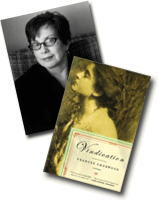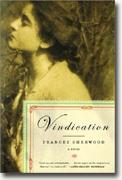About halfway through the novel, I realized that Mary’s life, while fascinating, is fraught with ongoing difficulties. How did you balance the story so that the reader wouldn’t be overwhelmed by Mary’s problems?
I hoped I achieved a balance. I think that novels are about the mystery of our existences and not public accomplishments. I was writing a novel, not a biography or eulogy. I tend to think that whatever progress we make as individuals or as society are gained through struggle and dedication. The miracle is effort and faithfulness.
Historically, Wollstonecraft is a remarkable and important figure in women’s
literature. How is it that she hasn’t been discovered before this? Or has she?
Mary Shelley, her daughter has, I believe, received more attention. Her daughter was in the Romantic Period, a time more attractive to people in our age. Also Mary Shelley was less controversial, more accessible, indeed known as Percy Shelley’s wife. Also Mary Shelley’s Frankenstein was a model for much that was to follow. Remember that Mary Wollstonecraft was primarily an essayist, not usually a popular genre.
Women are so obviously at the mercy of society in the 18th century, as evidenced by Mary’s sojourn in Bedlam. Can you speak to this perception of women at the time?
Mary Wollstonecraft was not really in Bedlam. I made that up because I found the history of Bedlam so interesting. However, she was terribly melancholy, did attempt suicide twice. Actually I think we “let” women be melancholy. We expect it in any age, and sometimes venerate it. Men are supposed to be emotionally strong, aren’t they? Don’t they go out and kill lions and other people?
Clearly a product of her difficult childhood, Mary is branded by her early experience with an unloving father. Given the circumstances, did she have any chance when making relationship choices?
This is a good point because we tend to repeat patterns. Mary was used to abuse, had experienced it and witnesses it from a very young age. It takes a very self-aware person to escape the repetition. But remember, she married William Godwin, a dear, good man. Unfortunately she died before she was able to reap the full benefit of that relationship.
In contrast to her brilliant writing, Mary is subject to the melancholia of the poets of her time. Would these moods be described today as manic-depression?
Yes, I think she was manic-depressive, or what we call bipolar. And no meds! But I must say she utilized those manias!
Mary experiences some horrific incidents as a young mother caring for her small daughter. Her intuition tells her to remove her daughter from harm. Was this situation inevitable, given Mary’s lack of good family models?
This is a big point of contention. Mary never threw her baby against the wall as I have her do in my book. However, she was not a particularly good mother to her first daughter who committed suicide as a young woman. Mary Wollstonecraft’s mother was not a good mother and her father was an absolute brute. Gilbert Imlay, her lover and the father of the baby, left Mary’s mother. Some people have terrible parenting and become overprotective, abusive, or very good parents. I don’t think anything is inevitable. Mary Wollstonecraft died at 38 years old, at the birth of her second child. In time, with a good marriage, perhaps she would have become a good mother. However, when men are not great parents, don’t we tend to forgive them?
During a euphoric period before the birth of her second child, Mary imagines her little family all together, happy. But would she have realistically been able to tolerate the stress any better than after the first child?
Yes. She was older, getting wiser.
Women like Wollstonecraft prepared the way for the feminists that would follow. Do you think she had any idea how pivotal, how groundbreaking her writing would be to future generations?
She broke ground within the patriarchy simply by speaking up, becoming visible, daring to believe in equality and wring about it.
What did you find most enjoyable about writing Vindication? Most difficult?
I loved writing it. I wrote it in a frenzy of love.
Are there any issues brought up in Vindication that you would like to speak to?
I think I do my talking in the book. It stands.
Do you have any projects planned that you can share with us?
Since Vindication, I published two novels, Green, and The Book of Splendor. The Book of Splendor is currently a paperback available in bookstores. I have also written many short stories. “Basil the Dog” is available on the web. My short story, “Pilgrims” will be published in Zoetrope this summer. I will be finishing a new novel, Betrayal, in December 2004.
Do you have any advice for would-be authors?
Yes. Keep the faith.


